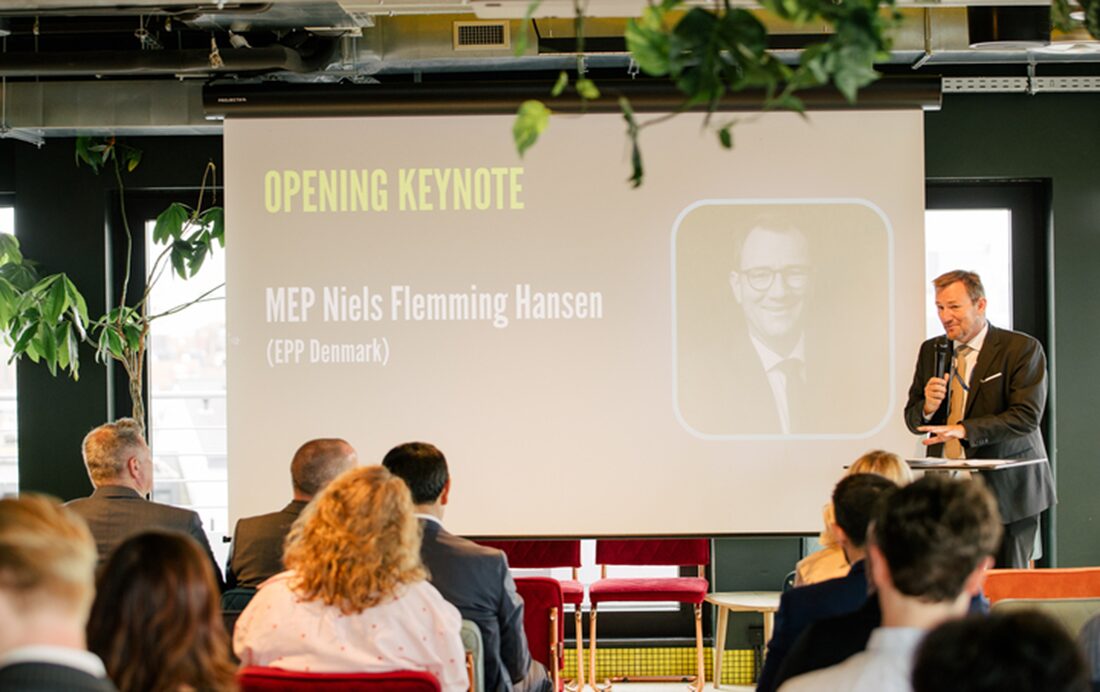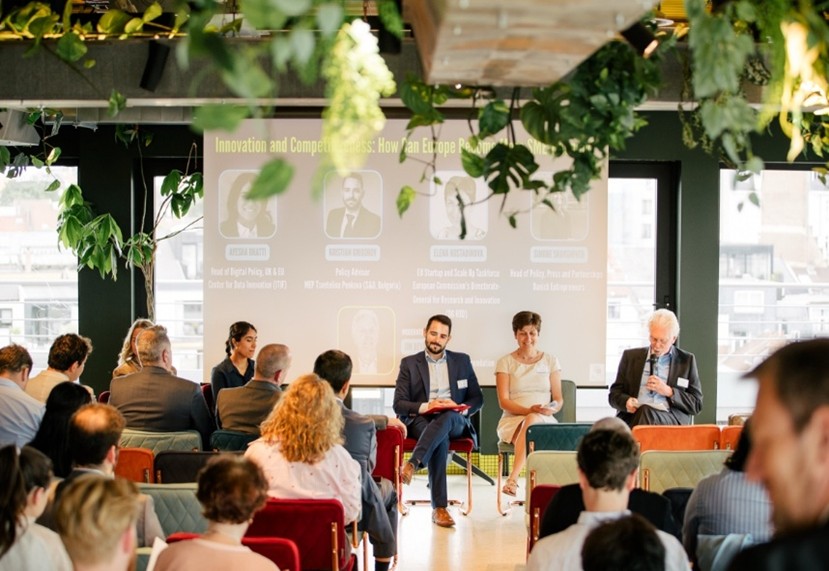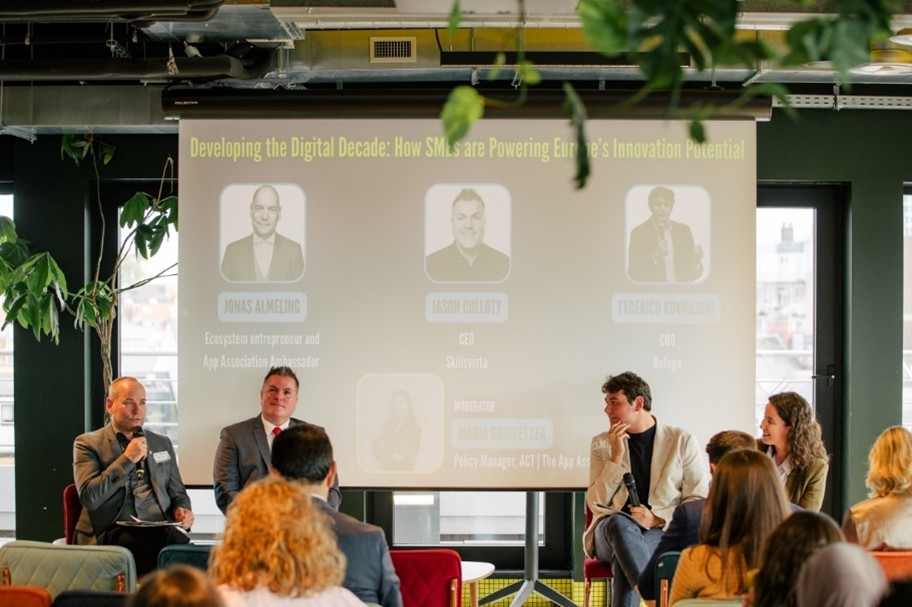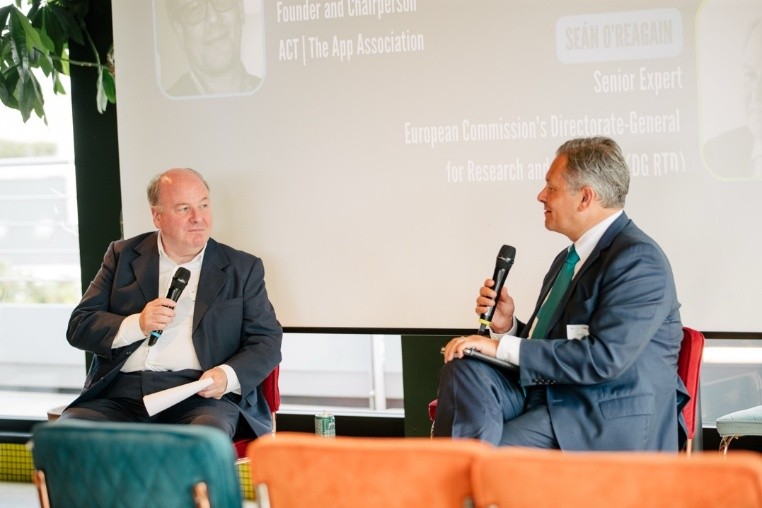Startups, scaleups, and small and medium-sized tech enterprises (SMEs) are the backbone of Europe’s economy and innovation ecosystem. They drive growth, competitiveness, and create jobs, acting as key drivers of progress and playing a vital role in making Europe more resilient, dynamic, and competitive. But often, Europe’s regulatory environment fails to match the ambition and agility of these businesses, resulting in a difficult environment for them to scale and grow.
On 24 June, our Developed: Brussels event brought together EU policymakers, innovators, and digital economy experts for a high-level discussion on driving smarter policy, supporting SMEs’ growth, and building a more competitive digital economy. Participants explored how we can unlock Europe’s full potential during the current mandate and beyond.
Keynote with MEP Niels Flemming Hansen
Across Europe, SMEs are the backbone of our economy (..) and yet far too often they are drowning in red tape, struggling with complex rules and outdated bureaucracy instead of focusing on growth and innovation. This is why I say here today, “think small first”.
– MEP Niels Flemming Hansen (EPP, DK)

During his address, MEP Hansen reminded us why startups and SMEs are indispensable to Europe’s economic strength. He stressed the need to unleash their potential through the establishment of the Capital Market Union, the implementation of the 28th regime, and a broad regulatory cleanup via the upcoming Digital Omnibus.
‘If rules are too complex, if our processes are too slow, if our single market feels more like 27 minimarkets, then we are failing our customers’.
– MEP Niels Flemming Hansen (EPP, DK)
MEP Hansen’s remarks set the stage for the day, providing a strong foundation for the conversation that followed. By highlighting the critical role of tech SMEs and the policy shifts required to empower them, he gave our speakers a powerful starting point to dive deeper into the challenges and opportunities that Europe’s innovators face.
Panel one – Innovation and competitiveness: How can Europe become more SME-friendly?
Moderated by Jim Beveridge, our first panel brought together ecosystems and policy experts Simone Skovshoved from Danish Entrepreneurs, Ayesha Bhatti from the Center for Data Innovation, Kristian Grigorov, EP Policy Advisor to MEP Tsvetelina Penkova (S&D), and Elena Kostadinova, Member of the European Commission’s Taskforce on Startups & Scaleups, to discuss harmonisation, funding, and the opportunities to streamline Europe’s regulatory landscape.
Simone Skovshoved called out the inconsistent application of the General Data Protection Regulation (GDPR) across Member States as one example of a core barrier to competitiveness. While not disputing the value of the regulation itself, she emphasised the operational burden it places on small businesses navigating a fragmented compliance landscape.

‘GDPR, the rules themselves, they’re not the problem (..). It’s the friction, and it’s the lack of harmonisation across the EU Member States. That’s the big tackle. This is especially relevant for the startups we want to see stay in the single market. We know that 30 per cent of our unicorns relocate, and this is partially the reason’.
– Simone Skovshoved, Head of Policy, Press and Partnership at Danish Entrepreneurs
Expanding the lens, Ayesha Bhatti emphasised the need for EU policy to better incorporate the concept of ‘innovation rights’, a framework that assesses how regulations can proactively enhance access to essential services like healthcare and justice. Rather than treating innovation solely as a risk to manage, she advocated for viewing it as a tool to support socioeconomic rights, with policies designed accordingly.
From a structural standpoint, there was recognition that current EU frameworks often blur the lines between SMEs, startups, and scaleups. Kristian Grigorov, drawing on his work in the European Parliament, explained how this lack of clear definitions can limit the effectiveness of policy. Efforts are now underway to create distinct legal categories for these entities, an important step toward more precise and impactful support measures.
Rounding out the discussion, Elena Kostadinova offered a clear call for cohesion.
Startups do not grow in silence, and policy should not either. We want to create an entrepreneurial culture in Europe, so all the different legislative and non-legislative acts need to move in synchrony (..)The regulatory simplification is currently an ongoing process for all the different sectors. With the Innovation Act, we want to (..) create a positive atmosphere and look forward to how we can do to promote innovation.
– Elena Kostadinova, Member of the Taskforce on Startups & Scaleups at the European Commission’s Directorate-General for Research and Innovation (DG RTD)
The panel made it clear that for Europe to become truly SME-friendly, policy must not only reduce friction but actively enable innovation. Harmonisation, legal clarity, and simplification are key to keeping startups growing within the single market.
Panel two – The Digital Decade: How SMEs are powering Europe’s innovation potential
In our second panel, moderated by Maria Goikoetxea, App Association members Jason Culloty (Ireland), Jonas Almeling (Sweden), and Federico Roviglioni (Italy) shared their real-world experiences of scaling digital innovation, emphasising how their companies are contributing to Europe’s Digital Decade and what they need from policymakers to keep innovating and growing. Their firsthand experiences reminded everyone of the importance of policies designed around real-life needs and practical challenges.

Among the most urgent needs raised was access to funding. As Jason Culloty of Skillsvista explained, real innovation depends on empowering the smaller players.
So, if you want to really be innovative, it is actually supporting the startups and the small scaleups and the small-to-medium enterprises because they’re the ones that feed in and actually support the larger enterprises that are too cumbersome to be able to adapt quickly’.
– Jason Culloty, CEO of Skillsvista
Jonas Almeling cautioned that regulation that doesn’t keep pace with infrastructure or innovation, stifles the very ecosystems it aims to guide. Without vibrant digital ecosystems, that are fast-moving and startup-friendly, there is nothing meaningful left to regulate. He urged policymakers to look ahead and prioritise creating the connective infrastructure that makes a real digital market possible.
Echoing the need for cohesion, Federico Roviglioni made a strong appeal for European-level leadership.
I believe that making the right decisions at the European level will also push countries to be aligned, to be on the same page. (…) We let you listen to our voices, but you [the Commission] also push the sovereignty of other countries to go in the same direction’.
– Federico Roviglioni, COO Bufaga
Taken together, their experiences made a clear case: Europe’s digital ambitions depend not only on innovation from the ground up, but on frameworks that move quickly and consistently across borders. Policymakers must listen and act to ensure startups have the conditions they need to lead.
If you are interested in learning more about our members’ experiences, check out this live thread on our @ACTMembers handle and give us a follow while you are there.
Forward-looking fireside chat
To conclude the day, the European Commission’s Senior Expert Seán O’Reagain and App Association Founder and Chairperson Mike Sax discussed how Europe must move from innovative ideas to commercial success, investing more decisively in startups and scaleups. They underlined the need for flexible, future-proof regulation that can keep pace with technological change and stressed the importance of establishing the principles of a 28th regime to help companies expand cross-border and access new markets.

We need to recognise the rate at which technology is moving forward, and it’s very difficult to regulate in a stable way. We need to have a way of regulating Europe that can take into account rapid changes.
– Seán O’Reagain, Senior Expert at the European Commission’s Directorate-General for Research and Innovation (DG RTD)
Mr. O’Reagain reiterated the essential role of SMEs, who must have a seat at the table not only during the design of legislation, but also throughout its implementation at both EU and Member State levels.
Looking ahead
We’re grateful to all the speakers and attendees who joined us for Developed: Brussels and contributed to such a thoughtful and solutions-oriented discussion. The App Association remains committed to working with policymakers on these crucial topics. We will continue to advocate for policies that support startup, scaleups, and tech SMEs, reduce barriers to innovation, cut regulatory burdens, and help startups and scaleups innovate and thrive in the digital economy. Together with our members, we will keep pushing for an ecosystem in which entrepreneurs can grow and lead.